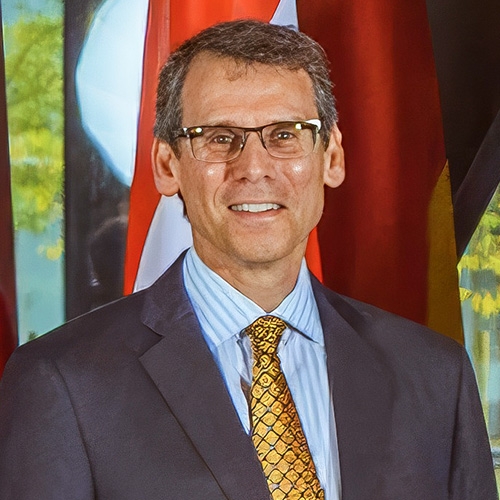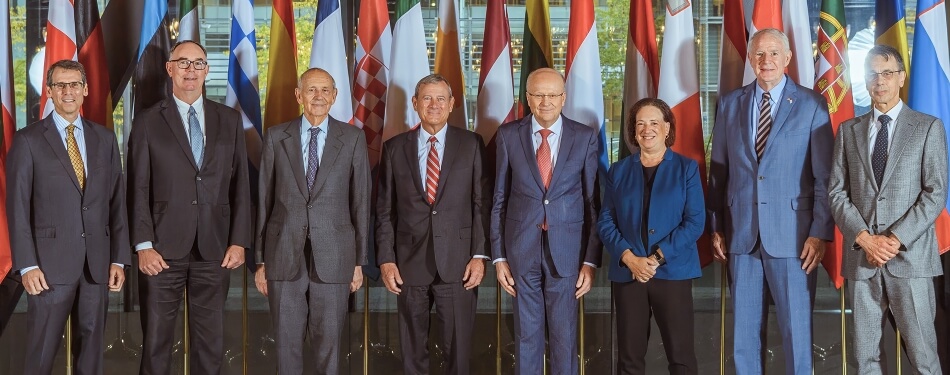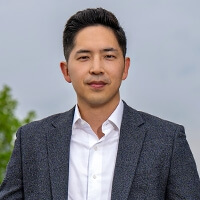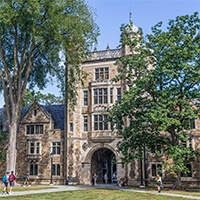Professor Daniel Halberstam recently took part in an official visit by a delegation from the US Supreme Court to the Court of Justice of the European Union (CJEU).
The CJEU, which is located in Luxembourg, ensures that EU law is interpreted and applied consistently in every member country. The Supreme Court delegation consisted of Chief Justice John Roberts Jr., Associate Justice Elena Kagan, retired Associate Justice Stephen Breyer, Counselor to the Chief Justice Robert M. Dow Jr., and Ambassador Thomas M. Barrett, along with two academics—Halberstam, the Eric Stein Collegiate Professor of Law and director of the European Legal Studies Program; and Armin von Bogdandy, director of the Max Planck Institute for Comparative Public Law and International Law in Heidelberg, Germany.

Halberstam is the only legal scholar to have worked both in the chambers of a judge at the European Court of Justice (ECJ), the top court of the CJEU, and as a clerk at the US Supreme Court.
“The goal of these meetings is to have the two courts understand more fully each other’s role and legal system, and to discuss matters of shared interest,” Halberstam said. “Although the two systems differ greatly, of course, many issues these two courts confront are nonetheless strikingly similar—not least because each is the highest court of a federal or federal-type system.”
On the first day of the two-day visit, the Supreme Court delegation was welcomed by CJEU President Koen Lenaerts. They heard a presentation on the EU court and judicial system before taking part in a working session with members of the Court of Justice on the subject of “Recent Trends and Developments in Judicial Management and Procedures.” The delegation also attended a hearing before the Grand Chamber of the CJEU.
The second day of the visit included working sessions devoted to “The Rule of Law and the Protection of Judicial Independence” and ‘The Protection of Privacy in the Digital Economy.”
The visit ended with an audience with His Royal Highness the Grand Duke of Luxembourg and a visit to the Chamber of Deputies.
“These are strictly closed-door judicial meetings, not an academic conference, so I am limited in what I can report,” Halberstam said.
“My main role was to oversee preparation of the underlying materials for one of the substantive topics, provide a comparative introduction at that working session, and moderate the discussion.”
Regular meetings between the US Supreme Court and the CJEU have taken place since 1998.
In 2017, a delegation of 14 members of the Court of Justice came to Ann Arbor for several days, in conjunction with their visit to the US Supreme Court, and discussed issues with Michigan Law faculty.
“I’ve had the privilege of being part of these exchanges since the first time the US Supreme Court visited the European Court of Justice, when I happened to be working in the chambers of the Austrian judge at the ECJ,” Halberstam said.
“Participating in some capacity in most of these meetings over the past 25 years—whether in Luxembourg at the ECJ or in Washington, DC, at the US Supreme Court—provides a useful perspective on these two apex courts, especially for someone working on EU, US, and comparative constitutional law.”
He added, “It was also personally rewarding to visit with former students and members of the Michigan Law School family at (and on) the court.”
These included Siniša Rodin, LLM ’92 (judge, ECJ); former research scholars Tamara Ćapeta (advocate general, ECJ), Tamara Perišin (judge, General Court), and José Antonio Gutierrez Fons (legal secretary); Filip Kuhta, LLM ’13 (legal secretary); Mirna Romić, LLM ’12 (legal secretary); and this year’s judicial interns, Sarah Siegel, ’22, Grace Bruce, ’24, and Emily Hammerslough, ’24.
Banner image: The US Supreme Court delegation to the Court of Justice of the European Union included, from left, Michigan Law Professor Daniel Halberstam, Robert M. Dow Jr. (counselor to the chief justice), Justice (ret.) Stephen G. Breyer, Chief Justice John G. Roberts Jr., President Koen Lenaerts, Justice Elana Kagan, Ambassador Thomas M. Barrett, and Professor Armin von Bogdandy of the Max Planck Institute for Comparative Public Law and International Law.







